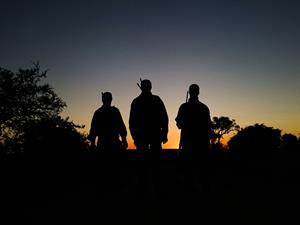
PUMPA - SMART LEARNING
எங்கள் ஆசிரியர்களுடன் 1-ஆன்-1 ஆலோசனை நேரத்தைப் பெறுங்கள். டாப்பர் ஆவதற்கு நாங்கள் பயிற்சி அளிப்போம்
Book Free DemoIn the deepening twilight three figures were walking across the lawn towards the window, they all carried guns under their arms, and one of them was additionally burdened with a white coat hung over his shoulders. A tired brown spaniel kept close at their heels. Noiselessly they neared the house, and then a hoarse young voice chanted out of the dusk: “I say, Bertie, why do you bound?”
Explanation:
As Mr Nuttel turned towards the French window, he saw three individuals walking across the lawn towards the house. Since it was past sunset, and as the sky was losing light, Mr Nuttel could make out only their silhouettes. As they neared, he could see that the three were carrying guns under their arms. Moreover, Mr Nuttel could see that one of them had a white coat hung over his shoulder. The visitors also had a companion: a tired brown spaniel. As they approached the house quietly, a hoarse young voice chanted from the darkness: “I say, Bertie, why do you bound?”
From the above paragraph, it is clear that the visitors were the dead men from Vera's story. The "three figures" mentioned in the paragraph refers to the three men- Mrs Sappleton's husband and two brothers. The guns that they were carrying represents the hunting game they had been to. The person carrying the white coat is Mr Sappleton, whereas the "hoarse young voice" that recited the line from the song "Bertie the Bounder" belonged to Ronnie, Mrs Sappleton's youngest brother. Moreover, Vera had also mentioned in her story that the men were accompanied by their hunting dog the day they had died.
Another curious aspect of the above paragraph is that one could track the movement of the visitors through the given description. We can see how the men were mere figures in the beginning. It was because they were in the distance. As they got closer to the house, Mr Nuttel could make out the guns under their arms. Further on, the colour of the coat and the spaniel were visible. Again, the coat was mentioned before the spaniel because the colour "white" is easily viewed when compared to dark colours such as brown. So, making out colours such as brown, especially during the dusk, would mean that the visitors have almost reached the house. Moreover, the words such as "twilight" at the beginning of the paragraph and "dusk" towards the end suggest the passing of time.

Three figures were walking in the deepening twilight
Meanings of difficult words:
S.No | Words | Meanings |
1 | Twilight | The period just before it becomes completely dark in the evening; the period between sunset and dusk |
2 | Hoarse | Of a voice that sounds rough or weak |
3 | Chant | To sing a word to a simple tune, or to repeat it continuously |
4 | Dusk | The time just before night when the day has almost lost all its light but it is not completely dark yet; roughly, the period between twilight and night |
5 | Bound | To jump or leap about |
Reference:
National Council of Educational Research and Training (2008). The Open Window – Saki (pp. 55 - 61). Published at the Publication Division by the Secretary, National Council of Educational Research and Training, Sri Aurobindo Marg, New Delhi.